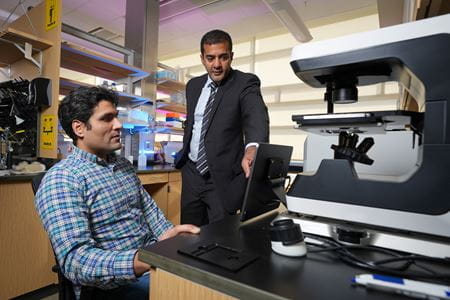Indiana University School of Medicine researcher Vijay Ramakrishnan, MD, is leading a multi-institutional five-year, $3.5 million grant from the National Institute of Allergy and Infectious Diseases (NIAID) to investigate better ways to predict surgical outcomes for chronic rhinosinusitis patients and limit unnecessary surgeries.
Chronic rhinosinusitis, an inflammatory disease that causes the sinuses to swell, affects 30 million Americans each year. While most people seek relief through sprays and rinses, close to 15% of patients choose an elective endoscopic surgery to remove blockages in the sinuses.
“Patients go into surgery with different expectations and hopes for their outcome than what might be achievable in their particular situation,” said Ramakrishnan, professor of otolaryngology—head and neck surgery. “This is a step towards personalized medicine. We are creating an individualized model of outcomes prediction that can be used to help a person decide if they want to pursue elective surgery for a common chronic condition. It’s a great — and low-risk — opportunity to find a fit for AI-based predictive analytics in medicine.”
The team of researchers, including clinicians and scientists at Northwestern University, the University of Colorado, Oregon Health and Science University and the Medical University of South Carolina, are developing an artificial intelligence-driven model to predict clinical outcomes for patients who are considering endoscopic sinus surgery for chronic rhinosinusitis. They are also taking qualitative and user-centered design approaches to understanding how patients and surgeons would need to deliver this in a real-world clinical setting.
“It’s great to dream about AI and what it can do in medicine, but ultimately you’ve got to understand what the user wants, or you can end up spending years making a widget that nobody uses,” Ramakrishnan said.
The research centers around shared decision making and patient-centered approaches to chronic rhinosinusitis treatment. Ramakrishnan, who is also a primary investigator at Stark Neurosciences Research Institute, said when electing to have a surgery, the risks and benefits need to be understood between the patient and surgeon.
“We as surgeons try to understand and explain to patients with chronic rhinosinusitis about their personalized risks in an open and honest way,” Ramakrishnan said. “But the benefits to the surgery that we've been able to tell them about are very vague. One common saying is that 80% of people get at least 50% better. For a patient, that’s not personalized.”
Ramakrishnan, who received another grant from the NIAID to study the sinus microbiome in chronic rhinosinusitis, is working with Snehasis Mukhopadhyay, PhD, professor of computer and information science at Purdue University in Indianapolis, to develop the AI model using machine learning. The prediction model will include patient characteristics and surgical outcomes data from multiple sites across the country that Ramakrishnan and colleagues have been collecting for several years. Results from an early version of the model show about 85-86% accuracy.
“What makes this next-level technology is a human-in-the-loop approach to AI,” Ramakrishnan said.
Human-in-the-loop means that surgical experts in chronic rhinosinusitis participate during model development and offer feedback. Ramakrishnan said many people have a hard time trusting AI, especially when it’s providing input on important medical decisions like choosing to have surgery, so the human element is crucial to the success of the model.
“It may somehow recognize little details that surgeons miss. But also, there is clearly something to be gained from surgeons’ experience and human intuition,” Ramakrishnan said. “The doctor, the patient and the computer are all in the same room together. That's the easiest, safest way to roll out AI in medicine — it’s complementary in the shared decision-making process.”
The grant will also dive deeper into why patients consider surgery and how they would want AI incorporated into their decision making. Ramakrishnan is collaborating with implementation scientists and qualitative experts at the Regenstrief Institute to interview patients from different educational and socioeconomic backgrounds and with different experiences in healthcare.
